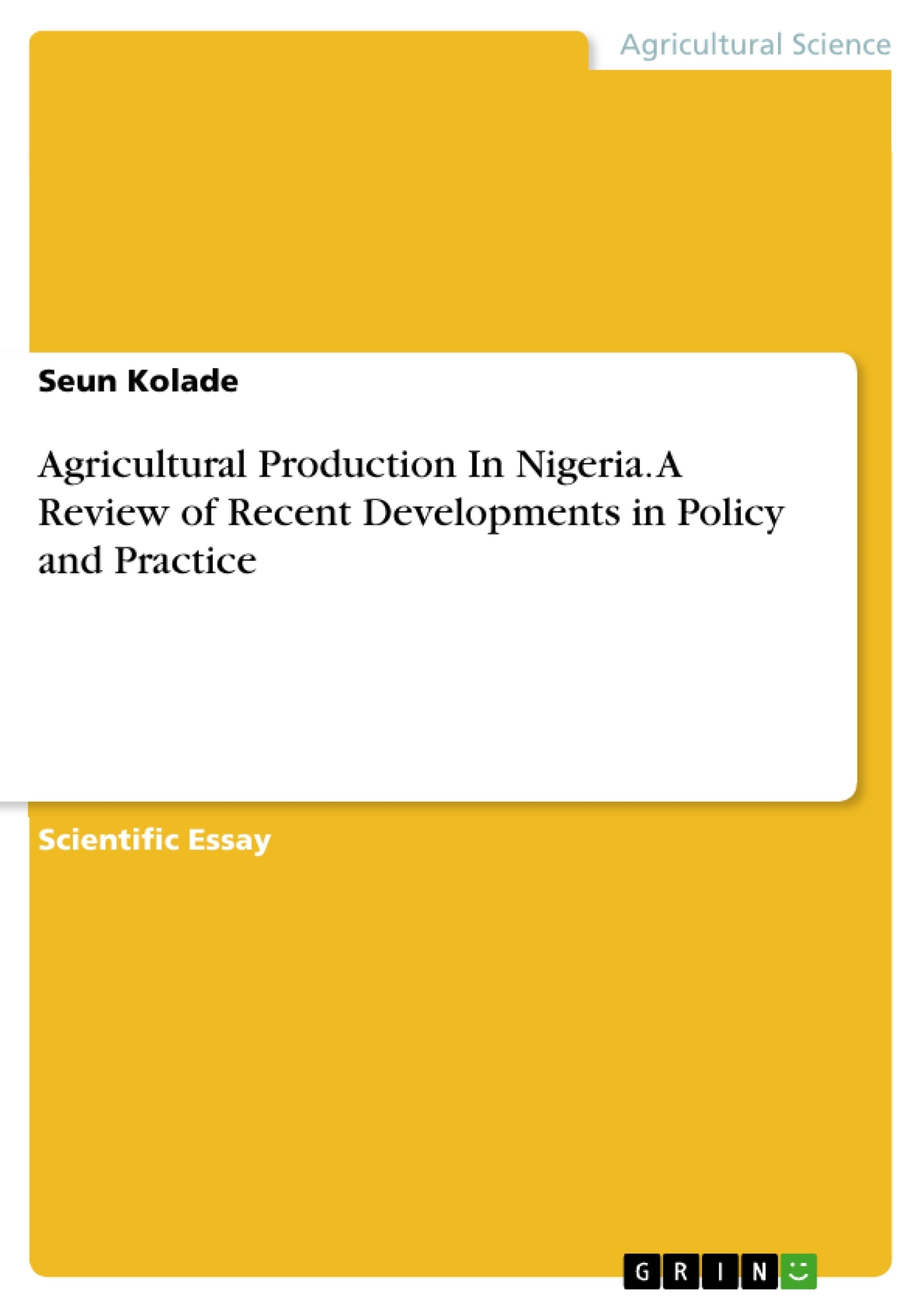This article draws on critical review of research articles, official statistics and policy documents on agricultural production in Nigeria, especially since the beginning of the current democratic dispensation in 1999.
This paper highlights the findings of researchers and policy makers on the significant gains made in the agricultural sector, especially in terms of increased productivity of staple crops like cassava and rice. However, this review also identifies significant gaps in knowledge and deficiencies in practice, in the areas of innovation diffusion among rural farmers, market reforms, engagement in high value chains, and the politics of policy implementation and evaluation.
Table of Contents
- Abstract
- 1. Introduction
- 2. Rural poverty, food poverty and farming practices
- 3. Social organisation of agricultural production
- 4. The challenge of agricultural credit and appropriate technology
- 5. Agricultural development interventions
- References
Objectives and Key Themes
This article provides a critical review of research, statistics, and policy documents on agricultural production in Nigeria since 1999. Its aim is to highlight key research findings, identify knowledge gaps, and critically reflect on the challenges associated with food security and rural development interventions. The review examines farming practices, the social organization of agricultural production, and the challenges related to agricultural credit and technology.
- Rural poverty and its impact on agricultural production
- The role of farming practices and technological innovation in addressing poverty
- The social organization of agricultural production and its implications
- Challenges related to agricultural credit and appropriate technology
- The effectiveness of government interventions in agricultural development
Chapter Summaries
1. Introduction: This introductory chapter sets the stage for the article by outlining the renewed interest in Nigeria's agricultural sector following the end of military rule in 1999. It introduces the diverse sources used in the review (academic research, official statistics, policy documents) and states the intention to highlight key findings, knowledge gaps, and challenges in designing and implementing food security and rural development interventions. The chapter then gives a brief overview of the subsequent discussion points, focusing on farming practices, social organization of agriculture, and challenges with agricultural credit and appropriate technology.
2. Rural poverty, food poverty and farming practices: This chapter presents statistics highlighting the disproportionate impact of poverty on rural Nigerians, especially since 1980. It explores the causes of this rural poverty, including unequal resource allocation by successive governments, leading to a disparity in development between urban and rural areas. The chapter examines the consequences of this disparity, such as limited access to land and credit, reliance on primitive farming implements, and the resulting low agricultural productivity and household incomes. The chapter then delves into the state of farming practices, noting low land cultivation per household, reliance on rain-fed agriculture, the impact of environmental degradation (climate change and land degradation), and the continued use of primitive farming implements as significant factors contributing to low yield and crop failure.
Keywords
Agricultural production, rural development, innovations, food security, Nigeria, poverty, farming practices, technology, credit, government interventions.
Frequently Asked Questions: A Comprehensive Language Preview of Agricultural Production in Nigeria
What is the purpose of this document?
This document provides a critical review of research, statistics, and policy documents on agricultural production in Nigeria since 1999. Its aim is to highlight key research findings, identify knowledge gaps, and critically reflect on the challenges associated with food security and rural development interventions.
What topics are covered in this review?
The review examines farming practices, the social organization of agricultural production, and the challenges related to agricultural credit and technology. It also explores the impact of rural poverty on agricultural production and the effectiveness of government interventions in agricultural development.
What are the key themes explored in the document?
Key themes include rural poverty and its impact on agricultural production; the role of farming practices and technological innovation in addressing poverty; the social organization of agricultural production and its implications; challenges related to agricultural credit and appropriate technology; and the effectiveness of government interventions in agricultural development.
What is the scope of the research covered?
The review includes academic research, official statistics, and policy documents on Nigeria's agricultural sector since 1999, focusing on the period after the end of military rule.
What are the main findings regarding rural poverty and farming practices?
The review highlights the disproportionate impact of poverty on rural Nigerians, particularly since 1980. It attributes this to unequal resource allocation, leading to limited access to land and credit, reliance on primitive farming implements, low agricultural productivity, and low household incomes. The continued use of primitive farming techniques, reliance on rain-fed agriculture, and environmental degradation (climate change and land degradation) are identified as significant factors contributing to low yields and crop failures.
What challenges are discussed concerning agricultural credit and technology?
The document examines the challenges related to access to agricultural credit and appropriate technology, highlighting their significant impact on agricultural productivity and the overall development of the sector.
What is the role of social organization in agricultural production?
The review analyzes the social organization of agricultural production and its implications for efficiency, productivity, and overall development. The intricacies of this social structure and its influence on agricultural practices are explored.
What is the assessment of government interventions in agricultural development?
The effectiveness of government interventions in agricultural development is critically examined, assessing their impact on food security and rural development.
What are the key words associated with this research?
Key words include: Agricultural production, rural development, innovations, food security, Nigeria, poverty, farming practices, technology, credit, government interventions.
What chapters are included in the document?
The document includes chapters on: Abstract, Introduction, Rural poverty, food poverty and farming practices, Social organization of agricultural production, The challenge of agricultural credit and appropriate technology, Agricultural development interventions, and References.
- Quote paper
- Seun Kolade (Author), 2016, Agricultural Production In Nigeria. A Review of Recent Developments in Policy and Practice, Munich, GRIN Verlag, https://www.grin.com/document/319352




